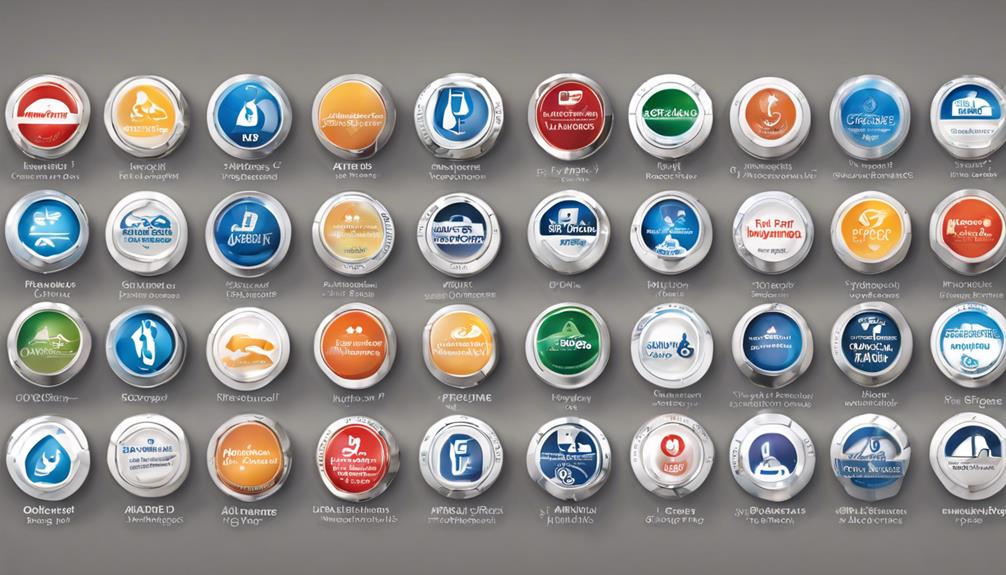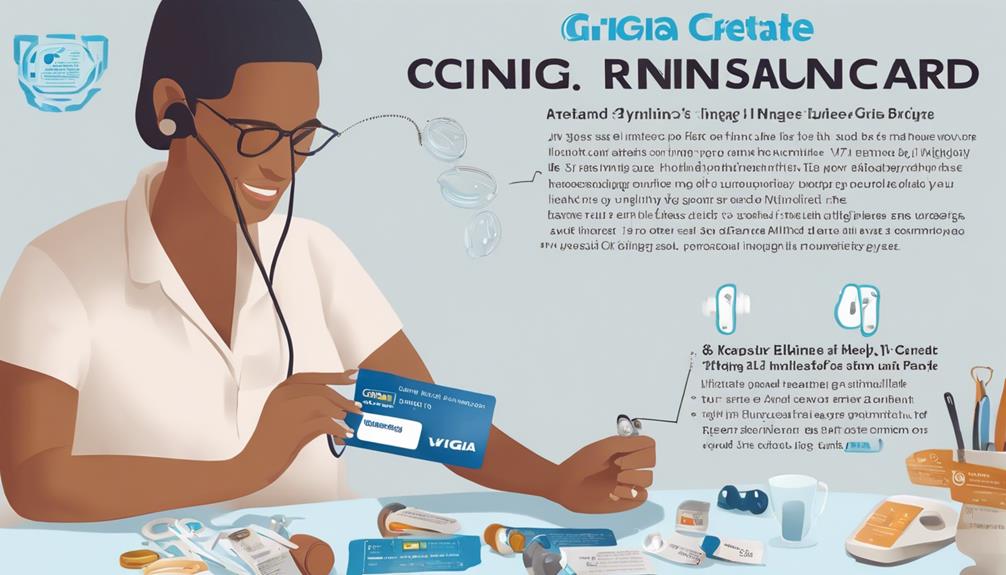During our examination of United Healthcare’s coverage of hearing aids, we uncover a wide range of benefits and options that may surprise you.
From understanding the intricacies of coverage to maximizing your hearing health benefits, there's a lot to consider when it comes to navigating UnitedHealthcare's policies.
Let's delve into the details and unravel the mysteries surrounding the coverage of hearing aids under United Healthcare — you won't want to miss what we uncover next.
Key Takeaways
- United Healthcare offers comprehensive coverage for hearing aids and related services.
- Coverage availability varies based on plan type, including Choice Plus and Medicare Advantage.
- Members should understand their cost responsibilities, including copayments and deductibles.
- Post-fitting support includes follow-up appointments and adjustments for optimal hearing health.
United Healthcare Hearing Aid Coverage Overview
UnitedHealthcare Hearing provides comprehensive coverage for hearing aids, offering members access to a network of over 7,000 hearing provider locations nationwide. This patient-centered approach is a hallmark of United Healthcare's commitment to hearing health. Through various insurance plans, including Medicare Advantage plans, UnitedHealthcare ensures that individuals have access to hearing tests, consultations, follow-up care, and a range of prescription and over-the-counter hearing aids. The coverage for hearing aids extends beyond just the devices themselves; it encompasses the full spectrum of services needed for optimal hearing health.
UnitedHealthcare's experience of over 20 years in connecting members with affordable hearing health care underscores its dedication to providing quality services. As part of UnitedHealth Group, which includes Optum focusing on delivering care through technology and data, UnitedHealthcare Hearing leverages a robust network to ensure that members receive the best possible care for their hearing needs. United Healthcare's commitment to comprehensive coverage for hearing aids reflects its mission to prioritize the well-being of its members.
Types of Plans Offering Hearing Aid Benefits

Exploring the various types of insurance plans available can provide insight into the diverse range of coverage options for hearing aids. Popular UnitedHealthcare plans like Choice Plus and Medicare Advantage may offer coverage for hearing aids. Additionally, dual-eligible plans designed for Medicare and Medicaid recipients from UnitedHealthcare often provide an allowance for hearing devices.
It's important to note that coverage for hearing aids under UnitedHealthcare plans varies depending on the specific plan and benefits offered. Some UnitedHealthcare plans may even include discounts on both over-the-counter and prescription hearing aids. To fully understand the benefits, limitations, requirements, and potential discounts related to hearing aid coverage, it's advisable to review the plan details directly with UnitedHealthcare.
Cost Responsibilities for United Healthcare Members
When considering hearing aid coverage under their UnitedHealthcare plan, members should carefully assess their financial responsibilities to understand any potential out-of-pocket costs. Here are some key points to consider:
- Plan and Benefits: Different UnitedHealthcare plans offer varying levels of coverage for hearing aids. It's crucial to review the specifics of your plan to determine what's covered.
- Deductible: Some plans may require members to meet a deductible before hearing aid coverage kicks in. Understanding this amount is essential to budgeting for the cost.
- Copayment or Coinsurance: Depending on your plan, you may be responsible for a copayment (a fixed amount) or coinsurance (a percentage of the total cost) when purchasing hearing aids.
- Contacting Hearing Care Provider: Speaking with a hearing care provider can help clarify the coverage details, limitations, and out-of-pocket expenses associated with obtaining hearing aids under your UnitedHealthcare plan. It's advisable to gather as much information as possible to make informed decisions about your hearing healthcare.
Navigating the Hearing Aid Coverage Process

Navigating the process of obtaining hearing aids can be simplified by reviewing your United Healthcare plan documents to understand the specifics of your coverage. Understanding your coverage is crucial in maximizing the benefits provided by UnitedHealthcare Hearing. Contacting United Healthcare's customer service can offer valuable insights into the insurance coverage for hearing aids and help clarify any uncertainties.
Seeking guidance from recommended audiologists or hearing care professionals can streamline the process and ensure that you receive the necessary support. It's essential to be aware of any potential out-of-pocket expenses and explore available financial assistance options to alleviate the cost of hearing aids.
Post-Fitting Expectations and Support
After reviewing your United Healthcare plan documents to understand the specifics of your coverage, it's important to be prepared for the post-fitting expectations and support that come with obtaining hearing aids. Here are some key points to consider during this phase:
- Follow-Up Appointments: Expect to have follow-up appointments for adjustments and fine-tuning of your new hearing aids.
- Potential Co-Pays: Additional visits after the fitting may incur a co-pay depending on your UnitedHealthcare plan.
- Adjustment Period: The period after receiving your hearing aids may require patience and support from your provider as you acclimate to them.
- Open Communication: Encourage open communication with your provider to address any questions or concerns during the post-fitting period.
UnitedHealthcare plans focus on enhancing the quality of life for individuals experiencing hearing loss by providing ongoing support as they adjust to their new hearing aids. Remember that effective communication with your healthcare provider is crucial for a successful hearing healthcare journey.
Frequently Asked Questions
Does United Healthcare Cover Hearing Aids 2023?
Yes, United Healthcare covers hearing aids in 2023. Coverage may vary depending on the specific plan and benefits offered.
Plans like UnitedHealthcare Choice Plus and UnitedHealthcare Options PPO typically include coverage for medically necessary hearing aids.
Medicare Advantage plans may also provide coverage or discounts on hearing aids. Dual-eligible plans may offer an allowance of around $1,100 for hearing devices.
It's essential to check your specific plan for coverage details.
What Brand of Hearing Aid Does Unitedhealthcare Use?
We can find various hearing aid brands covered by UnitedHealthcare, such as Phonak, ReSound, Oticon, and Widex. The specific brand available depends on individual plan details.
UnitedHealthcare partners with numerous hearing aid providers offering a range of top brands. By consulting in-network providers, members can explore different brand options.
Understanding these brands helps in making informed choices to address one's hearing needs effectively.
How Can Hearing Aids Be Covered?
Hearing aids can be covered by UnitedHealthcare based on medical necessity and plan benefits. Specific plans like UnitedHealthcare Choice Plus and Medicare Advantage may offer coverage or discounts for hearing aids.
Dual-eligible plans for Medicare and Medicaid recipients through UnitedHealthcare provide an allowance for hearing devices. Understanding the coverage details in the plan information is crucial for determining how hearing aids are covered.
How Come Hearing Aids Are Not Covered by Insurance?
We understand that insurance coverage for hearing aids may be a concern. In the past, insurance companies may have viewed hearing aids as elective or cosmetic, leading to limited coverage.
As awareness grows about the impact of untreated hearing loss on overall health, insurance providers are starting to recognize the necessity of hearing aids. Advances in research and advocacy efforts are also influencing the shift towards more comprehensive coverage for these essential devices.
Conclusion
In conclusion, UnitedHealthcare's coverage for hearing aids is comprehensive and flexible, offering various plans to meet individual needs.
An interesting statistic to note is that over 48 million Americans experience some degree of hearing loss, making access to affordable hearing aids essential for improving quality of life.
By understanding and utilizing UnitedHealthcare's benefits effectively, individuals can take proactive steps towards better hearing health.










